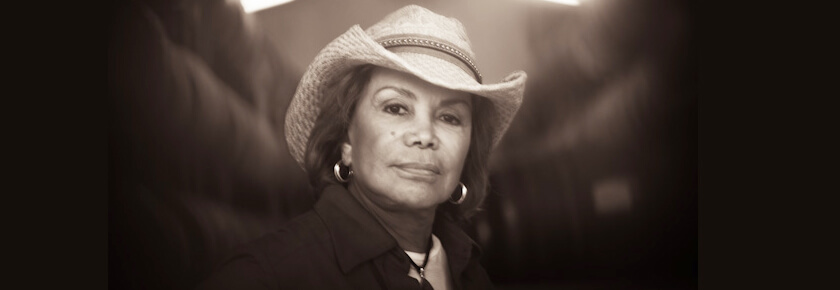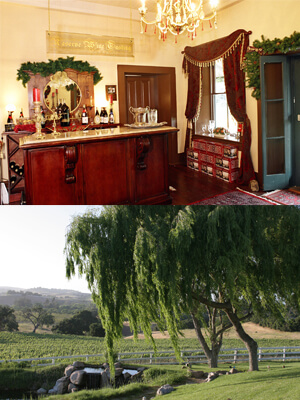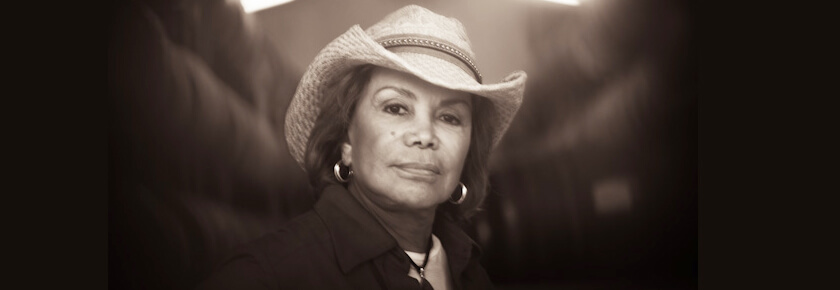

Alcohol
Iris Rideau, Wine Pioneer
How a single teen mom went from toiling at a sewing factory to becoming the first African-American female winemaker in the country.
This article was made possible because of the generous support of DAME members. We urgently need your help to keep publishing. Will you contribute just $5 a month to support our journalism?
In the sometimes fusty world of wine, with its old country ways, Iris Rideau is a cool breeze of change. A great-grandmother at 76 and still a Creole beauty, she is not only the sole African American female vintner in the country, but her winery is almost entirely run by women. This is a big deal in an industry in which – according to Winemakers.com – only 10% of California’s 3,400 wineries have a woman as their lead winemaker.
Rideau wasn’t born into a life that would’ve predicted her “retiring” to the Santa Ynez Valley with millions to her name. She left New Orleans for Los Angeles at age 12, and by 17, she was married, divorced and raising a baby daughter. She attended high school at night, and worked at a sewing factory with her mother during the day. At the factory, “the line of mostly Black and Hispanic women would wrap around the corner in the mornings,” Rideau recalls. “We made about $15 a week. I knew I’d need an education or I’d never escape.”
 After junior college, she got a receptionist position at an insurance agency but in the late ‘50s Blacks weren’t allowed to work in front-office jobs so Rideau had to “pass” for White to keep her employment. In 1967, a remarried Rideau started her own insurance agency, operating out of her home in the racially diverse enclave of West Los Angeles. By 1982, she was an investment banker with her own securities firm.
After junior college, she got a receptionist position at an insurance agency but in the late ‘50s Blacks weren’t allowed to work in front-office jobs so Rideau had to “pass” for White to keep her employment. In 1967, a remarried Rideau started her own insurance agency, operating out of her home in the racially diverse enclave of West Los Angeles. By 1982, she was an investment banker with her own securities firm.
Since 1997, Rideau has owned 16 acres of vineyard that can yield 10,000 cases a year. Rideau’s wines have been featured in Wine Enthusiast Magazine, won Best in Show in the Los Angeles International Wine Competition, and have garnered more than 30 awards for individual wines since 1997.
After visiting the winery’s romantic grounds – home to 300-year-old oak trees and 500 barrels of Syrah, Viognier, Mourvedre, Roussanne and Grenache – DAME got on the phone with Rideau for a chat.

The stress was incredible. I couldn’t put a picture of my daughter on my desk like everyone else. It took a toll on me. I was always afraid of losing my job. When I left to get remarried, I started taking classes at UCLA to learn insurance under-writing. After that, I never “passed” again.
Yes, I became a specialist in writing insurance contracts for federally funded programs in Black and Hispanic sections of the city called “curfew” areas after the L.A. riots. I was the first woman to work as a broker with The Hartford Company, and I worked with then-Mayor Tom Bradley to form citywide Affirmative Action programs. I became a kind of lobbyist for women and minorities.
I got scared of being a single woman living out in the country. I thought I’d be bored out of my mind, so I started another company. There are only two options in the Central Valley: grow grapes or raise horses. I drink a lot of wine and I don’t ride horses.
It’s not old boys, but it’s still pretty much all White. The young winemakers, who used to work for the rich white men, have become accomplished winemakers themselves and want to make their own labels. In this valley it’s about 75% young men—but all white.
There are some very big boys here for sure but the Central Coast took off about 10 years after Napa, not until the early ‘80s. My vines are Rhone varietal. The Santa Ynez area is the same microclimate as the Rhone region of France. Whatever they plant there, that’s what we plant here.
It’s very difficult to find women winemakers. Their avenue in was through studying Viticulture and Enology in college. They were called “lab girls.” They primarily worked in labs and ran tests for the men. Now they’re moving out of the labs and into the wineries. There were only about 3-4 women winemakers when I started 16 years ago.
Oh yes, I love the power and confidence it gives to young women. I love being able to say my associate winemaker is a woman, my enologist is a woman, and my general manager is a woman.
The saying in wine is, “it takes a large fortune to make a small one.” Planting a vineyard can cost $35,000 per acre. I have 13 acres planted. I’ve got $700,000 in equipment. Labor costs $50,000 per month. In total, it costs about $200,000 a month to run my business. How many people can do that?
I sell completely out of my tasting room. It’s unheard of. I tried selling wholesale, but after 9/11 I quit. Visitors starting coming because I’d serve them a bowl of gumbo or jambalaya. They’d sit on the patio and we’d pair the right wine with the food. Then we started passing out Mardi Gras beads. We have about 2,000 visitors a month. When I first started in 1997 I sold 300 cases in a year. Today I sell about 7,500 cases a year. I sell online and I have about 1,700 members in our wine club. My gross sales are around $3.5 million a year.
I have a very special friend. We have shared interests – wine and food. He’s also in the wine business. We’ve both been single for more than 35 years, and we’re still trying to figure out how to create a lifetime relationship in the last couple of chapters of our lives.
You can usually find me at the winery, at a party, or at home with my Havanese dog Ricky Ricardo on my lap. I also have a standing Thursday night card game with my 96-year-old mother called “Spite and Malice.”
I think it comes from being poor. My mother was content with being poor, but I’ve been driven since that sewing factory to be successful and established. And my family showered me with love and the confidence to do whatever I dared. The vineyard has given me the “I’ve finally done it” feeling.
Before you go, we hope you’ll consider supporting DAME’s journalism.
Today, just tiny number of corporations and billionaire owners are in control the news we watch and read. That influence shapes our culture and our understanding of the world. But at DAME, we serve as a counterbalance by doing things differently. We’re reader funded, which means our only agenda is to serve our readers. No both sides, no false equivalencies, no billionaire interests. Just our mission to publish the information and reporting that help you navigate the most complex issues we face.
But to keep publishing, stay independent and paywall free for all, we urgently need more support. During our Spring Membership drive, we hope you’ll join the community helping to build a more equitable media landscape with a monthly membership of just $5.00 per month or one-time gift in any amount.




















































































